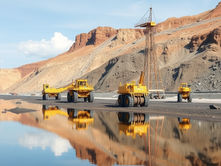top of page
All Articles


Shifting Gears: Africa's EV Market Revs up for Rapid Expansion
It is not uncommon to hear motor mechanics in Zimbabwe saying, "I don't do hybrids or electric cars." This means that they do not repair hybrid cars or electric vehicles. Finding spares or servicing a hybrid or electric vehicle in the country remains one of the biggest challenges. However, many people in Zimbabwe are now slowly embracing hybrid cars, particularly small compact vehicles like the Toyota Aqua, Toyota Prius, and Honda Fit, as well as subcompact crossover SUVs lik


Moved by Colonial Electricity Dams, Rural Zimbabweans Uprooted again for Chinese "Smart Energy Deals"
As decarbonization becomes a global catchphrase, Zimbabwe has become a vital supplier of critical lithium ore and several platinum group metals that are key to the green transition. According to the Supply Chain Intelligence for the Energy Intelligence, Zimbabwe is the fourth largest producer of lithium mined globally.
But in Magunje, western Zimbabwe, the remnants of indigenous Zimbabweans displaced by colonial dams' construction 100 years ago are enduring a new wave of fo


The Gulf's Energy Transition- 2025 Review: Part 3
Sulfur is traditionally viewed as a low-value byproduct of oil refining and is largely stockpiled or exported for fertilizer production. However, this element is increasingly being considered as a key enabler for next-generation batteries. With some of the world's largest sulfur reserves and production volumes, the Gulf is uniquely positioned to turn this underutilized resource into a strategic advantage.


The Gulf's Energy Transition- 2025 Review: Part 2
Rather, such approaches are more about providing regions, especially those heavily dependent on oil and petroleum exports, with pragmatic pathways to a clean energy transition and a bridge between legacy infrastructure and next-generation clean-tech value chains.


How Zimbabwe Can Leverage Rising Lithium Demand
Lithium mining in Zimbabwe has followed the resource curse route—a paradox of plenty. All the communities rich in lithium are frustrated with the plunder. Not one community is benefiting. Their portion is to pay the externalized costs of lithium mining: land grabbing, exhumation of the remains of loved ones, water grabbing, violence, dust and noise pollution, among others.
bottom of page



